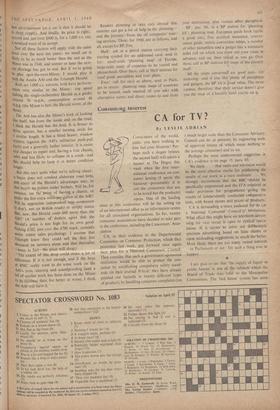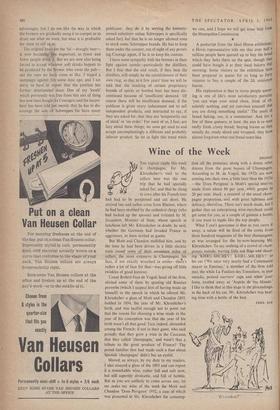Consuming interest
CA for TV?
By LESLIE ADRIAN
CA,'in their •evidence to the Departmental Committee on Consumer Protection, which they presented last week, put forward once again their plea for a National Consumers' Council. They consider that such a government-sponsored institution would be able to protect the con- sumer by establishing compulsory safety stand- ards (in their journal Which? they have already pointed out hazards in twenty different types of product), by handling consumer complaints (on a much larger scale than the Consumer Advisors. Council can di) at' present), by registering seals_ of approval (many of which mean nothing the average consumer) and so on.
Perhaps the most controversial suggestion it, CA's evidence is on page 15, para.'45.- ' 'We think . . that radio and television would'. be the most effective Media for publicising the results of our work to a mass audience: . . . We strongly recommend that the BBC'sluitild be specifically empowered and the ITA-required to make provision for progranimes"giving the results of independently -concluded .cuinparative tests, with brand names and prices 'Of ..It4oducts: 'CA is demanding amass audience 1014 its (or a National Consurnet- Council's)! revelations What effect this might haVe on teleVisibti..iiivert- ising (or vice versa) is'-open to cynthal' Specu-- lation. If it serves. to- 'drive out •detitferately spurious advertising .based on fake Claith5s of upon misleading suggestiorisyso muellthei better_ More likely there are too many vested' interestt
-in Parliament or out-----fat such a thing ever 'to happen.
I am glad to see that. 'the supply of liquor to public houses' is one of , the subjects which the Board- of Trade may refer to the Monopolies Commission. The 'tied house' system has some advantages; but I do not like the way in which the brewers are gradually using it to compel us to drink not what we want, but what it is profitable for them to sell to us.
The original basis for the lie'—draught beer— is now becoming *ss important, as fewer and fewer people drink it. But we are now also being forced to accept whatever soft drinks happen to be produced by the brewer who owns the pub— not the ones we have come to like. I waged a campaign against this some time ago, and I am sorry to have to report that the position has further deteriorated since. One of my 'locals' which previously was free from this sort of thing has now been bought by Courages; and the incum- bent.has been told riot merely that he has to dis- courage the sale of Schweppes (as have many publicans: they do it by serving the brewery- owned substitute unless Schweppes is specifically asked for), but that he is no longer allowed even to stock some Schweppes brands. He has to keep them under the counter, out of sight of any prowl- ing Courage agent, if he is to keep his custom.
I have some sympathy with the brewers in their fight against cartels—particularly the distillers. But I fear that the end result, if they beat the distillers, will simply be the establishment of their own ring; so that in a few years' time we will be told that the stocking of certain proprietary brands of spirits or bottled beer has been dis- continued because of 'insufficient demand.' Of course there will be insufficient demand, if the publican is given every inducement not to sell independent products, and instructed to say, if they are asked for, that they are `temporarily out of stock' or 'on order.' For most of us, I fear, are lazy about these things; we soon get used to and accept uncomplainingly a different and probably inferior product. So let us fight this trend while we can; and I hope we will get some help fruit: the Monopolies Commission.
A postscript from the Ideal Home exhibition: a Hovis representative tells me that over half a million people have queued up to buy the bread which they bake there on the spot, though they could have bought it at their local bakery that morning. Some visitors to the exhibition have been prepared to queue for as long as forty minutes to buy a couple of the 2d. miniature loaves.
His explanation is that to many people queue• ing is one of life's most satisfactory pursuits; `you can wipe your mind clean, think of :lb' solutely nothing, and yet convince yourself that you are doing something useful.' The smell of bread baking, too, is a mesmeriser. And for a few of these queuers, at least, the aim is to taste really fresh crusty bread; buying loaves as they usually do, ,ready sliced and wrapped, they have almost forgotten what real bread tastes like.



































 Previous page
Previous page